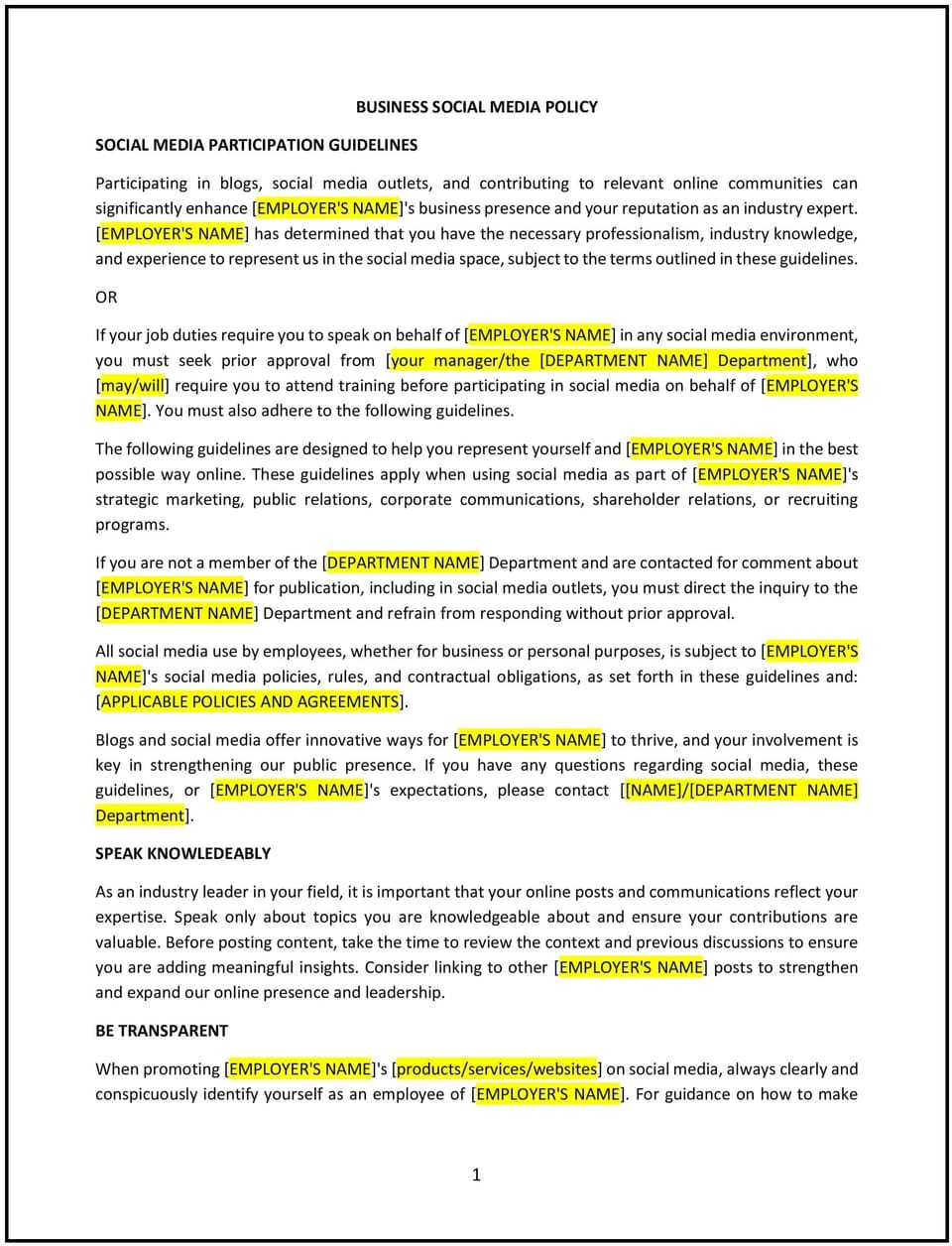Business social media policy (Hawaiʻi): Free template

Business social media policy (Hawaiʻi)
A business social media policy helps Hawaiʻi businesses establish guidelines for employees who use social media for work-related purposes or personal use that may impact the company. This policy outlines acceptable behavior, content ownership, confidentiality, and brand representation on social media platforms. It is designed to protect the business’s reputation, maintain professionalism, and address Hawaiʻi-specific considerations, such as cultural sensitivities and local laws.
By implementing this policy, businesses in Hawaiʻi can promote responsible social media use, safeguard confidential information, and enhance their online presence.
How to use this business social media policy (Hawaiʻi)
- Define scope and purpose: Specify whether the policy applies to work-related social media accounts, personal accounts, or both. Clearly state its purpose, such as protecting the business’s reputation and maintaining professionalism.
- Establish guidelines for professional accounts: Provide rules for managing business social media accounts, including posting frequency, tone, and content approval processes.
- Address personal use: Outline expectations for employees’ personal social media use, particularly when referencing the business, colleagues, or clients.
- Protect confidential information: Prohibit employees from sharing sensitive business information, such as trade secrets, financial data, or customer details, on social media.
- Emphasize cultural sensitivity: Encourage employees to be mindful of Hawaiʻi’s diverse cultural landscape when posting content or engaging online.
- Clarify content ownership: Specify who owns content created for business social media accounts and how it can be used.
- Train employees: Provide training on the policy’s guidelines, including best practices for social media use and potential risks.
- Review and update the policy: Regularly assess the policy’s effectiveness and make adjustments as needed to reflect changes in social media trends, laws, or business needs.
Benefits of using this business social media policy (Hawaiʻi)
This policy offers several advantages for Hawaiʻi businesses:
- Protects the business’s reputation: Clear guidelines help prevent inappropriate or damaging posts that could harm the company’s image.
- Maintains professionalism: The policy ensures employees represent the business appropriately online, fostering trust with customers and partners.
- Safeguards confidential information: Prohibiting the sharing of sensitive data reduces the risk of breaches or leaks.
- Encourages cultural sensitivity: Guidelines tailored to Hawaiʻi’s diverse culture help employees navigate social media respectfully and inclusively.
- Enhances brand consistency: A unified approach to social media ensures consistent messaging and branding across platforms.
- Reduces legal risks: The policy helps businesses address potential legal issues, such as defamation, copyright infringement, or privacy violations.
- Supports employee accountability: Employees understand their responsibilities when using social media, reducing the likelihood of misuse.
Tips for using this business social media policy (Hawaiʻi)
- Communicate the policy effectively: Share the policy with employees during onboarding and through regular reminders, such as emails or training sessions.
- Provide examples: Include examples of acceptable and unacceptable posts to help employees understand the guidelines.
- Train employees: Educate employees on the policy’s guidelines, including best practices for social media use and potential risks.
- Monitor compliance: Regularly review employee adherence to the policy and address any issues promptly.
- Be transparent: Clearly explain the policy’s purpose, benefits, and expectations to employees to build trust and cooperation.
- Review the policy periodically: Update the policy as needed to reflect changes in social media trends, laws, or business needs.
Q: Why should Hawaiʻi businesses adopt a social media policy?
A: Businesses should adopt this policy to protect their reputation, maintain professionalism, and ensure responsible social media use by employees.
Q: What should the policy include for professional social media accounts?
A: The policy should include guidelines for posting frequency, tone, content approval processes, and brand representation.
Q: How should businesses address employees’ personal social media use?
A: Businesses should outline expectations for personal use, particularly when referencing the business, colleagues, or clients, to avoid conflicts or reputational harm.
Q: How can businesses protect confidential information on social media?
A: Businesses should prohibit employees from sharing sensitive information, such as trade secrets or customer details, and provide training on confidentiality.
Q: Why is cultural sensitivity important in a social media policy?
A: Cultural sensitivity ensures employees respect Hawaiʻi’s diverse cultural landscape, fostering inclusivity and avoiding potential misunderstandings or offenses.
Q: Who owns content created for business social media accounts?
A: The policy should specify that the business owns content created for its accounts and outline how it can be used.
Q: How often should the policy be reviewed?
A: The policy should be reviewed annually or as needed to reflect changes in social media trends, laws, or business needs.
This article contains general legal information and does not contain legal advice. Cobrief is not a law firm or a substitute for an attorney or law firm. The law is complex and changes often. For legal advice, please ask a lawyer.


